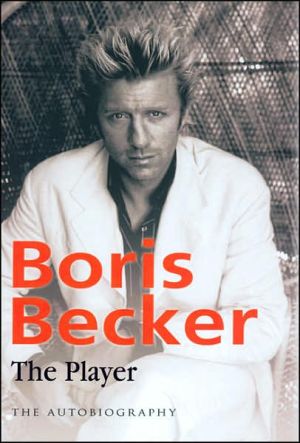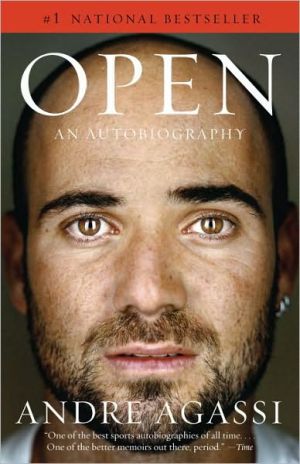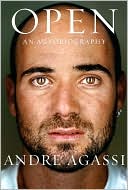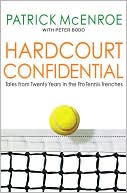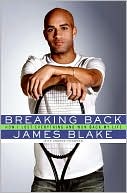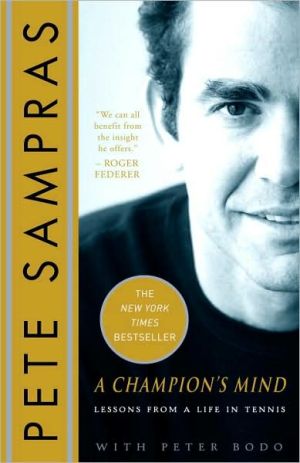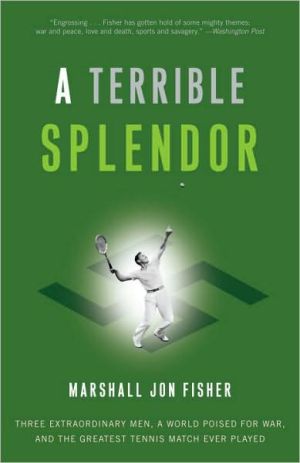The Player: The Autobiography
Boris Becker shot to fame in 1985 when, at 17, he became the youngest player ever to win the men’s final at Wimbledon. He went on to win two more Wimbledon titles, and a total of 49 singles and 15 doubles crowns, making him one of the greatest players of the 20th century. But his personal life always attracted as much attention as his professional triumphs. Now, in this remarkably candid autobiography, Boris Becker tells the real story behind the headlines. He talks about his marriage, his...
Search in google:
In this frank, tell-all autobiography, the German tennis genius reveals the highs and lows of his life both on and off the court.Boris Becker shot to fame in 1985 when at seventeen years old, he became the youngest player ever to win the men’s final at Wimbledon. He went on to win two more Wimbledon titles, and a total of forty-nine singles and fifteen doubles crowns, making him one of the greatest players of the twentieth century. But his life off the court has always attracted as much attention as his triumphs on it.Now, in this remarkably candid and thought-provoking autobiography, Boris Becker tells the real story behind the headlines. He speaks of the seconds before the serve that made him the youngest Wimbledon winner of all time, and of the minutes after being sentenced as a tax evader. He talks about his marriage, his illegitimate daughter, and his painful divorce. He reveals his emotions at the end of his tennis career, and his battles with pills and alcohol. He also shares his memories of the good times, the championship wins, the make-or-break matches, and the highs and lows of life on the international circuit.Boris Becker has written this autobiography not just for his fans but also for his children, that they may one day read the true account of their father’s remarkable, and often controversial, life.Author Bio:Born in Leimen, West Germany, in 1967, Boris Becker burst onto the international tennis scene in 1985 when, as an unknown 17-year-old, he rewrote the record books by beating Kevin Curren and winning the men’s final at Wimbledon. Not only was he the youngest player ever to win the title, he was also the first unseeded player and the first German. His exuberant, athletic style – hurling himself all over the court and making seemingly impossible shots – immediately endeared him to millions. On the back of his enormously powerful serve, he took the world of tennis by storm and by 1991 he was the world’s number one. His extraordinary career includes three Wimbledon men’s singles titles (he reached the final seven times in ten years) among a total of 49 singles and 15 doubles crowns, and he became the second youngest player (after Bjorn Borg) to be inducted into tennis’s Hall of Fame. Retiring from the pro-tennis scene in 1999, Becker refused to fade away – his name simply moved from the back pages of newspapers to the front. After losing his last match at Wimbledon to Pat Rafter, he set out on a night of binge drinking which culminated in the infamous Nobu broom cupboard incident. As a result, his high-profile marriage to model Barbara Feltus broke up in an equally high-profile divorce. He was back in court again soon afterwards with tax problems.
THE MAN ON THE MOON\ I'm serving for the championship. five steps to the baseline. My arm is getting heavy, wobbly. I look at my feet and almost stumble. My body starts to shake violently. I feel I could lose all control. I'm standing at the same baseline from where I served to 1-0 in the first set. 5-4; the end is getting nearer. I have to find a way to get these four points home.\ My opponent, Kevin Curren, piles on the pressure. 0-15. 15 all. 30-15. 40-15. I want, want, want victory. I look only at my feet, at my racket. I don't hear a thing. I'm trying to keep control. Breathe in. Serve. Like a parachute jump. Double fault. 40-30. How on earth can I place the ball in that shrinking box over there on the other side of the net? I focus on throwing the ball and then I hit it.\ The serve was almost out of this world, or at least its results were. This victory was my own personal moon landing. 1969 Apollo 11, 1985 Wimbledon 1. Back then, Neil Armstrong jumped from the ladder of the space capsule Eagle into the moondust and transmitted his historic words to the people of the world: 'That's one small step for man, one great leap for mankind.' But I couldn't muster words to meet the occasion. I could only think, Boy oh boy, this can't be true.\ The tension disappeared instantly and I felt slightly shaky. My heart was beating fast. I left crying to the others, though: my coach Günther Bosch, my father and my mother. 'With the passion of a Friedrich Nietzsche or Ludwig van Beethoven,' wrote Time in its next issue, 'this unseeded boy from Leimen turned the tennis establishment of Wimbledon on its head.'\ Although my Swedish colleague Bjšrn Borg was only seventeen when he entered the Wimbledon arena, he didn't win until three years later. John McEnroe started at eighteen but didn't hold the trophy until he was twenty-two. Jimmy Connors was twenty-one; Rod Laver, one of the greatest of our time, twenty-two. I was just seventeen years and 227 days old; I couldn't legally drive in Germany. I cut my own hair, and my mother sent me toothpaste because she was worried about my teeth. 'Boy King,' lauded the British newspapers. 'King Boris the First.' Meanwhile, King Boris was in the bath enjoying a hot soak. Back then, a physiotherapist was beyond my means.\ From that day on, nothing in my life remained the same. Boris from Leimen died at Wimbledon in 1985 and a new Boris emerged, who was taken at once into public ownership.\ Goodbye, freedom. Hands reaching out to you, tearing the buttons from your jacket; fingernails raking over your skin as if they wanted a piece of your flesh. A photograph, a signature - no, two, three, more . . . Love letters, begging letters, blackmail. Bodyguards on the golf course and on the terraces at Bayern Munich. Security cameras in the trees of our home, paparazzi underneath the table or in the toilets. Exclusive — see Becker peeing.\ And everything I did had consequences. One word of protest would lead to a headline. An innocent kiss would appear on the front page. A defeat and Bild would cry for the nation. A victory and the black, red and gold of the German flag was everywhere. Our Boris.\ The experts would write that it was my willpower and the 'boom boom' of my serve that got me through. But it isn't explained away so easily. On that day of my first victory at Wimbledon, forces were involved that went beyond mere willpower. Instinct made me do the right thing in the decisive moment, even if I didn't know I was going to do it. My heart was big, my spirit was strong, my instincts were sharp - only my flesh was sometimes weak. And no one can get out of their own skin.\ In 1986 Ion Tiriac, my manager, arranged an audience with the Pope. Ion is a devout man, and when he asked me if I wanted to see the Pope, I thought, sure, why not? I took my racket with me to get it blessed. At the time this was treated as crass commercialism, some kind of PR campaign for Puma, my racket-maker. How innocent I was then. I was only on the lookout for a little luck. But in the end, neither the man on the moon nor the one on the holy chair brought me victory. It was the indescribable, the unexplainable, the unheard-of, that got hold of me and sent me into a different orbit.\ And all I had to do was keep winning, again and again.\ From the Hardcover edition.
